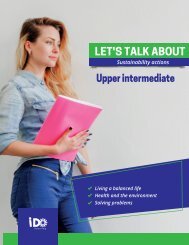Let's Talk About B1.2 (Intermediate)
Create successful ePaper yourself
Turn your PDF publications into a flip-book with our unique Google optimized e-Paper software.
4 Composes clear and well-structured<br />
oral or written messages taking into<br />
consideration the context in which they<br />
are produced using the necessary<br />
vocabulary and text structures. For example,<br />
when writing an e-mail, the student<br />
greets the person, composes the message,<br />
and closes appropriately.<br />
A student writes her teacher about her impossibility to attend her class.<br />
To: Angela Castro<br />
Subject: Absence to class this week<br />
Dear Ms. Castro,<br />
I was feeling sick this morning. My head<br />
hurt, I had a rash, and I had a high<br />
fever. I went to the doctor, and he told<br />
me that I needed to rest. I have<br />
chikungunya. For this, I will not attend<br />
your class this week. I will give you the<br />
written excuse.<br />
I will talk to my classmates to catch up.<br />
I hope that you<br />
understand my situation.<br />
Regards, Nathalie<br />
5 Exchanges opinions on topics of personal,<br />
social or academic interest in a natural and<br />
coherent manner using familiar expressions.<br />
For example, the student participates in a<br />
round table discussion giving his/her<br />
opinion on the topic being discussed.<br />
Juan: “Today we are going to talk about nature conservation,<br />
more speci cally about Parque Tayrona. The question is:<br />
Should we open this natural park to tourism investment?”<br />
Diana: “Well, rst, I want to say that we have to be careful with<br />
nature. When we destroy nature, we destroy our own life.”<br />
Carlos: “That is true! When we cut down trees, for example, we<br />
create problems with the production of oxygen in the planet<br />
and also with the erosion of the soil.”<br />
David: “I understand what you all mean, but investing in the<br />
country is also important. If<br />
we open the park to tourism investment,<br />
more people will have jobs, and families will<br />
have more places to go and spend their time<br />
together.”<br />
Diana: “I think that more jobs<br />
and more places to visit<br />
aren’t important. As I<br />
said if we destroy<br />
nature, we destroy our<br />
own life...”<br />
6 Holds<br />
spontaneous and simple<br />
conversations on topics of personal<br />
or academic interest.<br />
Depending on the purpose and audience, the<br />
student chooses appropriate expressions to begin,<br />
maintain, and end conversations. For example:<br />
Hi, Michael. How are you?<br />
Hi, Erica. I’m ne. How are you?<br />
I’m doing well. Hey! Did you<br />
w atch the new s last night? Nevado<br />
del Ruiz is melting! Can you imagine<br />
that?<br />
Oh my God! It’s terrible! I went<br />
there tw o years ago w ith my<br />
family, and it’s an awesome place.<br />
Is there any plan to recover it?<br />
They didn’t say, but I don’t think<br />
so because people don’t help.<br />
I hope somebody does something<br />
about it.<br />
Me too. Hey! I’m running late to<br />
class. I’ll see you later.<br />
Ok. Bye.<br />
7<br />
Responds<br />
to questions and inquiries<br />
academic topics of interest<br />
using information previously consulted and<br />
organized. For example, the student can clarify<br />
doubts from an audience on a topic. For example:<br />
How do earthquakes happen?<br />
“An Earthquake is the shaking of the earth by the<br />
unexpected movement of rocks below its surface. This<br />
surface, called crust, is made of tectonic plates. These<br />
plates are independent blocks of rock. They ‘crash’ or<br />
move away from each other and produce changes in the<br />
earth’s topography. The areas where these changes<br />
happen are called fault lines...”<br />
Q1: “What does topography mean?”<br />
Answer: “Topography is the con<br />
guration of the surface of the earth,<br />
including its relief.<br />
Q2: “Are earthquakes predictable?”<br />
Answer: “Earthquakes are hard to<br />
predict. The exact day, time and<br />
place of an earthquake cannot be<br />
anticipated. Scientists are trying to<br />
do it, but it is dif cult.”




